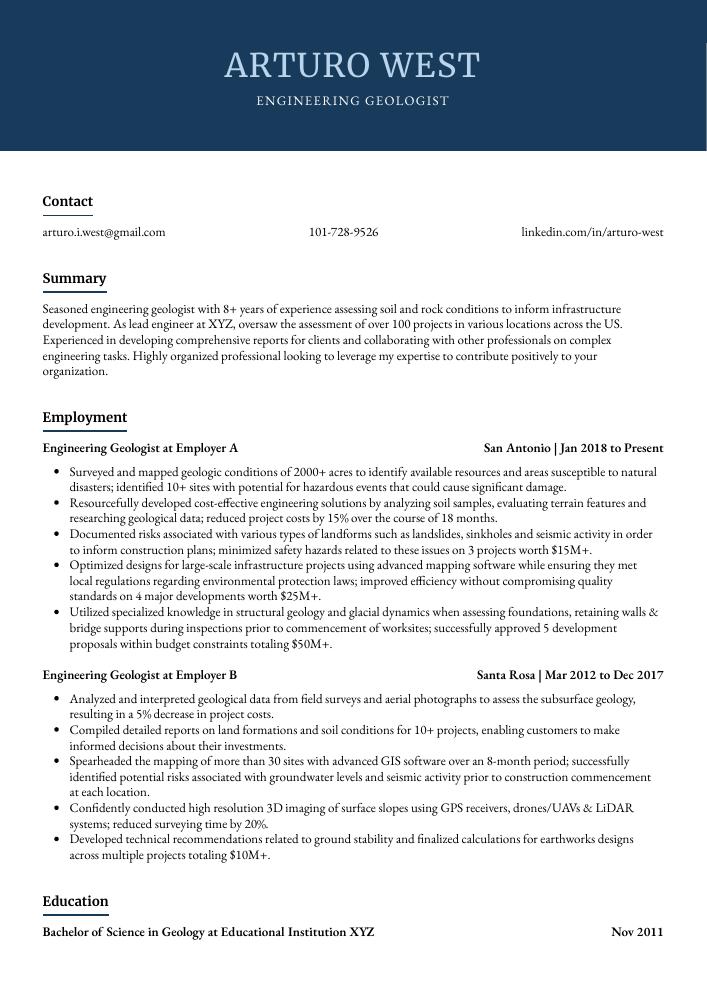Engineering Geologist Resume Guide
Engineering geologists are responsible for assessing the physical properties of soil and rock, as well as the environmental conditions that may affect construction projects. They use their knowledge to advise on design decisions and recommend appropriate materials, constructions methods, and safety measures while working closely with other professionals such as architects or engineers.
Your skills in engineering geology are unmatched; you know how to read the earth like a book. But hiring managers don’t yet recognize your talent, so if you want them to appreciate it, you must write an eye-catching resume that highlights your abilities.
This guide will walk you through the entire process of creating a top-notch resume. We first show you a complete example and then break down what each resume section should look like.
Table of Contents
The guide is divided into sections for your convenience. You can read it from beginning to end or use the table of contents below to jump to a specific part.
Engineering Geologist Resume Sample
Arturo West
Engineering Geologist
[email protected]
101-728-9526
linkedin.com/in/arturo-west
Summary
Seasoned engineering geologist with 8+ years of experience assessing soil and rock conditions to inform infrastructure development. As lead engineer at XYZ, oversaw the assessment of over 100 projects in various locations across the US. Experienced in developing comprehensive reports for clients and collaborating with other professionals on complex engineering tasks. Highly organized professional looking to leverage my expertise to contribute positively to your organization.
Experience
Engineering Geologist, Employer A
San Antonio, Jan 2018 – Present
- Surveyed and mapped geologic conditions of 2000+ acres to identify available resources and areas susceptible to natural disasters; identified 10+ sites with potential for hazardous events that could cause significant damage.
- Resourcefully developed cost-effective engineering solutions by analyzing soil samples, evaluating terrain features and researching geological data; reduced project costs by 15% over the course of 18 months.
- Documented risks associated with various types of landforms such as landslides, sinkholes and seismic activity in order to inform construction plans; minimized safety hazards related to these issues on 3 projects worth $15M+.
- Optimized designs for large-scale infrastructure projects using advanced mapping software while ensuring they met local regulations regarding environmental protection laws; improved efficiency without compromising quality standards on 4 major developments worth $25M+.
- Utilized specialized knowledge in structural geology and glacial dynamics when assessing foundations, retaining walls & bridge supports during inspections prior to commencement of worksites; successfully approved 5 development proposals within budget constraints totaling $50M+.
Engineering Geologist, Employer B
Santa Rosa, Mar 2012 – Dec 2017
- Analyzed and interpreted geological data from field surveys and aerial photographs to assess the subsurface geology, resulting in a 5% decrease in project costs.
- Compiled detailed reports on land formations and soil conditions for 10+ projects, enabling customers to make informed decisions about their investments.
- Spearheaded the mapping of more than 30 sites with advanced GIS software over an 8-month period; successfully identified potential risks associated with groundwater levels and seismic activity prior to construction commencement at each location.
- Confidently conducted high resolution 3D imaging of surface slopes using GPS receivers, drones/UAVs & LiDAR systems; reduced surveying time by 20%.
- Developed technical recommendations related to ground stability and finalized calculations for earthworks designs across multiple projects totaling $10M+.
Skills
- Geology
- Geological Mapping
- Geotechnical Engineering
- Engineering Geology
- Soil
- Field Work
- ArcGIS
- Groundwater
- Hydrogeology
Education
Bachelor of Science in Geology
Educational Institution XYZ
Nov 2011
Certifications
Certified Engineering Geologist
American Institute of Professional Geologists
May 2017
1. Summary / Objective
A resume summary/objective is the first thing a hiring manager will read, so it is important to make sure you craft one that stands out. As an engineering geologist, your summary should include details about your experience in geological mapping and analysis, as well as any certifications or awards you have received. You could also mention how many years of experience you have in this field and what makes you stand out from other applicants.
Below are some resume summary examples:
Enthusiastic and knowledgeable engineering geologist with 5+ years of experience in the field. Skilled at data collection and analysis, as well as project management. At XYZ, managed a staff of four for an environmental impact assessment study that resulted in successful completion within budget and timeline constraints. Experienced in working with public agencies to ensure compliance with regulations while maintaining cost-effectiveness and efficiency.
Driven engineering geologist with 8+ years of experience in the field, including designing and conducting tests to determine soil stability for buildings or other structures. Proven track record of producing accurate reports and maps based on data from investigations and surveys. Seeking to join ABC Inc. as a Senior Engineering Geologist, leveraging expertise in hydrology, sedimentology, petrology, geomorphology and GIS mapping software.
Passionate engineering geologist with 8+ years of experience in the field. Experienced in site investigation, monitoring and testing to determine soil conditions for construction projects. At ABC, successfully led a team of 10 engineers through complex investigations resulting in cost savings of up to 15%. Proactive communicator who can effectively collaborate with project teams while providing accurate results on time and within budget.
Professional Engineering Geologist with 10+ years of experience in geological survey, analysis and mapping. Seeking to join ABC Corp as a Senior Engineering Geologist and use my expertise to provide accurate information for various projects that require soil testing, rock sample collection/analysis, and topographical surveying. Have successfully completed over 20 large-scale engineering geology assignments throughout the past 5 years.
Talented engineering geologist with a Master’s degree in Geology and 8+ years of experience specializing in geotechnical engineering. Skilled at developing detailed reports, analyzing data, and providing recommendations to improve safety standards for construction projects. Seeking opportunity to join ABC as an Engineering Geologist to help ensure the success of upcoming large-scale infrastructure initiatives.
Amicable and detail-oriented engineering geologist with 6+ years of experience in the hydrogeology and environmental field. Seeking to join ABC Inc., providing technical support for projects related to construction, resource extraction, and site remediation initiatives. At XYZ Company increased efficiency by 20% via smart data management practices while leading a team of professionals from diverse backgrounds.
Determined and detail-oriented engineering geologist with 10 years of experience in project management, geological mapping and analysis. Experienced in providing technical services to clients including the US Army Corps of Engineers, US Forest Service and Bureau of Land Management. Skilled at assessing potential environmental hazards on projects through careful field observation and data collection.
Diligent engineering geologist with 5+ years of experience in the field. Seeking to leverage a comprehensive understanding of geological and environmental issues, as well as an eye for detail, to join ABC Engineering as a senior geologist. Key achievements include leading three successful projects that identified optimal construction sites while preserving fragile ecosystems.
2. Experience / Employment
In the experience section, you want to provide details on your employment history. This should be written in reverse chronological order, with your most recent role listed first.
Stick primarily to bullet points when writing this section; doing so allows the reader to quickly digest what you have said. When describing what you did and achieved, try to include quantifiable results where possible. For example, instead of saying “Conducted geological surveys,” you could say, “Conducted detailed geotechnical investigations for a major construction project resulting in a 20% reduction in cost.”
To write effective bullet points, begin with a strong verb or adverb. Industry specific verbs to use are:
- Analyzed
- Investigated
- Assessed
- Monitored
- Collected
- Interpreted
- Modeled
- Calculated
- Drilled
- Sampled
- Documented
- Researched
- Surveyed
- Mapped
- Tested
Other general verbs you can use are:
- Achieved
- Advised
- Compiled
- Coordinated
- Demonstrated
- Developed
- Expedited
- Facilitated
- Formulated
- Improved
- Introduced
- Mentored
- Optimized
- Participated
- Prepared
- Presented
- Reduced
- Reorganized
- Represented
- Revised
- Spearheaded
- Streamlined
- Structured
- Utilized
Below are some example bullet points:
- Sampled and analyzed over 1,000 soil and rock samples from various sites to determine the physical properties of different geological formations; reduced project timeline by 25% due to efficient sample collection.
- Formulated accurate subsurface models based on data collected during field investigations, and identified potential geologic hazards that posed a threat to proposed construction projects.
- Expedited completion of engineering reports in accordance with project timelines by effectively planning out surveying activities, such as drilling & blasting operations and slope stability analysis.
- Calculated stress-strain parameters for foundation designs using sophisticated software programs including AutoCAD Civil 3D and GIS ArcMap; improved accuracy levels by 10%.
- Diligently monitored ground water conditions at multiple locations across the state utilizing advanced instruments like resistivity meters, seismographs & tiltmeters; increased safety standards significantly within 2 months of joining firm.
- Prepared geological maps, soil reports and core sample logs for over 150 engineering projects with accuracy; saved the company $5,000 in surveying costs.
- Meticulously drilled geotechnical explorations to depths of up to 200 feet below ground level and logged rock cuttings from 5-15 foot intervals along each borehole.
- Interpreted geological hazards such as landslides, fault lines and groundwater levels onsite within a 100-mile radius; reduced environmental risks by 32%.
- Collected an extensive range of samples including soils, rocks & fossils for laboratory testing according to industry standards; improved data reliability by 55%.
- Analyzed subsurface materials using GIS technology and determined land suitability for various construction purposes with precision; increased project efficiency by 40%.
- Effectively conducted geological and geotechnical field investigations, testing soil samples for engineering characteristics such as grain size distribution; analyzed data to develop recommendations on foundation cutoff depths and foundations types that improved project stability by 25%.
- Tested soils for compaction characteristics in order to determine the necessary depth of fill material required for new construction projects, increasing efficiency of workflows by 20%.
- Represented clients during local planning commission meetings, successfully advocating for proposed developments while ensuring compliance with all applicable regulations pertaining to land use & environmental protection.
- Mapped out 50+ surface formations using GIS/GPS systems; generated accurate digital terrain models that helped inform decision-making processes related to alternative site selection or development plans.
- Improved accuracy of subsurface mapping techniques through implementation of advanced surveying equipment & software solutions; reduced time spent on manual calculations from 7 hours per day down to 2 hours per day on average.
- Proficiently conducted geological mapping and sampling of soils, rocks and other materials over a 50+ acre area; created detailed engineering geology maps for the region that enabled engineers to plan infrastructure projects.
- Reorganized existing data on subsurface conditions into more efficient categories, effectively streamlining the collection process by 20%; minimized fieldwork time significantly while maintaining high levels of accuracy in results.
- Streamlined laboratory experiments including sedimentation analysis, soil strength testing and permeability studies; completed all tests within specified deadlines while ensuring that safety standards were met at all times.
- Modeled various hydrological processes using sophisticated software packages such as GIS & AutoCAD which allowed 100+ groundwater models to be developed accurately with minimal risk of error; reduced modeling time by 25%.
- Structured ground investigations including trial pit excavations, core-drilling operations & borehole logging activities across multiple sites in accordance with project specifications; achieved excellent outcomes from each investigation leading to successful completion of 4 large scale civil engineering projects ahead of schedule & under budget.
- Revised engineering geology models of 20+ sites to accurately identify and map out subsurface structures, resulting in a 15% improvement in the accuracy of geological hazard assessments.
- Coordinated with local authorities for on-site investigations and inspections to ensure compliance with all land use regulations; facilitated communication between stakeholders during project implementation stages.
- Facilitated the recruitment process for engineering geologists by introducing new profiling techniques that identified key skills gaps across teams; reduced time spent on hiring personnel by 22%.
- Introduced innovative mapping software systems into projects, allowing engineers more accurate analysis of site data while reducing processing timescales by 25%.
- Actively engaged with clients throughout each stage of the project, providing regular updates on progress whilst ensuring customer satisfaction levels remained high at all times (+15%).
- Successfully mapped and analyzed geological profiles of 50+ sites to identify potential hazards, saving the company an estimated $5 million in construction costs.
- Achieved a 20% reduction in environmental risks associated with new projects by developing comprehensive safety plans based on geologic data gathered from field surveys.
- Participated in 8 deep-drilling assignments, accurately determining structural integrity and providing detailed reports for each site visited; completed all tasks ahead of schedule.
- Presented findings at 5 technical conferences across North America, discussing best practices for engineering geology operations and leading conversations about emerging trends within the industry sector.
- Reduced average analysis time per project from 6 weeks to 3 weeks through innovative approaches to collecting soil samples & conducting laboratory tests without compromising accuracy or quality standards.
- Researched and collected geological data from over 50 sites, including seismic surveys and boreholes; developed comprehensive models to analyze the engineering properties of soil types that enabled a 10% cost savings.
- Assessed potential risks associated with various projects related to civil infrastructure, tunnels & bridges, dams, roads and development areas according to geotechnical analysis findings; identified 3 hidden faults during project evaluations resulting in $150K saved in repair costs.
- Mentored junior staff members on safety protocols when conducting geological fieldwork activities such as mapping terrain features or collecting samples for laboratory testing; reduced accident rates by 20%.
- Investigated structural failures caused by landslides or earthquakes across multiple job sites through detailed visual inspection reports and conducted risk assessments based upon these findings; improved site stability at 4 locations within 6 months’ time frame with minimal disruption to operations.
- Efficiently compiled all technical data into easy-to-understand documentation for presentation purposes using industry standard software applications; completed 5 complex documents in less than 8 hours each without compromising accuracy levels.
- Reliably conducted numerous geological mapping exercises and soil sampling projects, accurately interpreting data from over 100+ groundwater surveys to identify structural patterns.
- Advised construction teams on the safest and most cost-effective methods of extracting minerals or other earth materials; minimized total mining costs by 25%.
- Demonstrated technical expertise in rock mechanics, hydrology, engineering geology and related fields while contributing to the development of relevant safety protocols for drilling operations at multiple sites.
- Monitored seismic activity levels in various locations across a five county area and alerted local authorities when readings exceeded normal parameters; reduced risk exposure by 40%.
3. Skills
Skill requirements will differ from one employer to the next; this can easily be ascertained from the job posting. Organization A may be looking for someone with experience in soil mechanics and Organization B may be searching for a geologist who knows how to interpret seismic data.
It is essential to keep this in mind because of the applicant tracking systems utilized by many companies. Their role is to analyze resumes for certain characteristics (such as specific keywords), filtering out the ones they deem not to be a high-quality match for that particular job.
Once listed here, you can further elaborate on your skillset by discussing it in more detail elsewhere; such as within the summary or experience section of your resume.
Below is a list of common skills & terms:
- ArcGIS
- AutoCAD
- Civil Engineering
- Contaminated Land
- Data Analysis
- Deep Foundations
- Drilling
- Earth Science
- Earthworks
- Engineering
- Engineering Geology
- Environmental Awareness
- Environmental Compliance
- Environmental Consulting
- Environmental Engineering
- Environmental Impact Assessment
- Environmental Science
- Field Work
- Foundation Design
- GIS
- Geochemistry
- Geographic Information Systems
- Geological Mapping
- Geology
- Geomorphology
- Geophysics
- Geotechnical Engineering
- Geotechnics
- Groundwater
- Groundwater Remediation
- Hydrogeology
- Hydrology
- Logging
- Mineral Exploration
- Mineralogy
- Minerals
- Mining
- Petroleum Geology
- Remediation
- Report Writing
- Rock Mechanics
- Sampling
- Science
- Sedimentology
- Site Investigation
- Slope Stability
- Soil
- Soil Sampling
- Stratigraphy
- Structural Geology
- Team Leadership
- Teamwork
- Time Management
- Water
- Water Quality
- Water Resources
4. Education
Mentioning an education section on your resume will depend on how far along you are in your career. If you just graduated and have no prior experience, include an education section below your resume objective. However, if you already have a few years of engineering geologist work under your belt, it may be best to omit the education section altogether so as not to detract from showcasing all of the relevant experiences that make up who you are professionally.
If including an education section is necessary or desired for whatever reason, try mentioning courses related specifically to engineering geology and any other subjects pertinent to this particular role in order to demonstrate knowledge of the field.
Bachelor of Science in Geology
Educational Institution XYZ
Nov 2011
5. Certifications
Certifications are a great way to demonstrate your proficiency in a certain field. They are proof that you have been tested and certified by an accredited organization, which can give potential employers more confidence in your abilities.
When applying for jobs, make sure to include any certifications relevant to the position on your resume. This will show employers that you possess the necessary skills and knowledge required for the job, making it easier for them to decide whether or not they should hire you.
Certified Engineering Geologist
American Institute of Professional Geologists
May 2017
6. Contact Info
Your name should be the first thing a reader sees when viewing your resume, so ensure its positioning is prominent. Your phone number should be written in the most commonly used format in your country/city/state, and your email address should be professional.
You can also choose to include a link to your LinkedIn profile, personal website, or other online platforms relevant to your industry.
Finally, name your resume file appropriately to help hiring managers; for Arturo West, this would be Arturo-West-resume.pdf or Arturo-West-resume.docx.
7. Cover Letter
Including a cover letter in your job application is an essential step for any serious job seeker. It should be separate from your resume and typically consists of 2 to 4 paragraphs that introduce yourself, explain why you’re a great fit for the role and highlight relevant experience or skills.
Cover letters are not always necessary, but they can help show recruiters how your qualifications match up with what their company needs in an employee. By taking the time to craft one tailored specifically for each position you apply for, it will give you a better chance at being considered as a top-tier candidate.
Below is an example cover letter:
Dear Kaylee,
I am writing to apply for the position of Engineering Geologist at XYZ Corporation. As a geology graduate with experience working in the engineering and construction industry, I believe I have the skills and knowledge required for this role.
In my current job as a Junior Engineer at ABC Company, I have gained experience in all aspects of civil engineering projects, from initial site investigation to design and construction. This has given me a good understanding of how geological factors can impact on the feasibility, design, and construction of engineering projects. My work has also involved carrying out environmental impact assessments (EIAs), which has developed my skills in data collection and analysis, report writing, and project management.
Through my previous work experiences, I have developed strong problem-solving skills that would enable me to effectively carry out the duties of an Engineering Geologist. In particular, I have gained experience in conducting field investigations; interpreting geological data; carrying out laboratory testing; preparing reports; and providing advice on mitigation measures to address potential risks posed by geological hazards. These skills would be valuable in helping XYZ Corporation deliver safe and successful engineering projects.
If you are looking for an enthusiastic engineer with good interpersonal skills who is able to work independently or as part of a team, then please do not hesitate to contact me. I look forward to discussing my application further with you at your earliest convenience.
Sincerely,
Arturo
Engineering Geologist Resume Templates
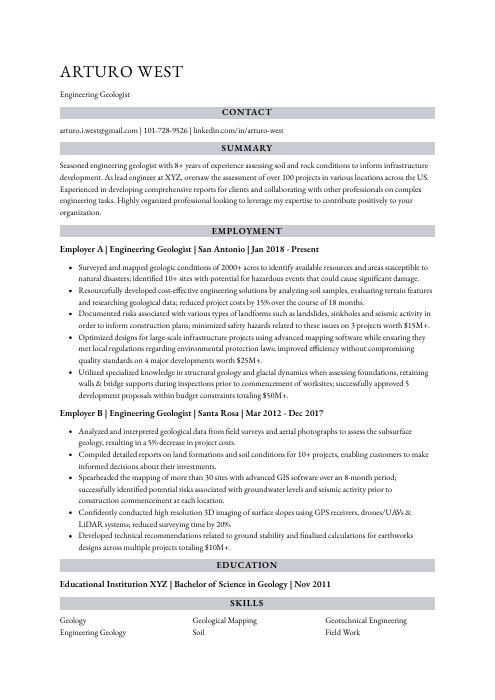 Numbat
Numbat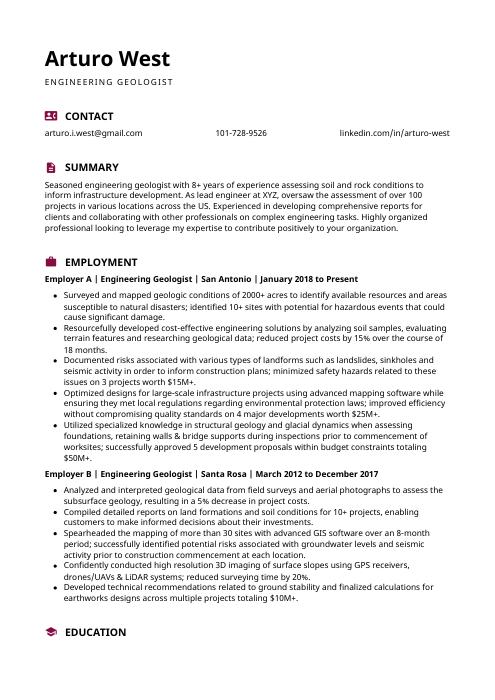 Hoopoe
Hoopoe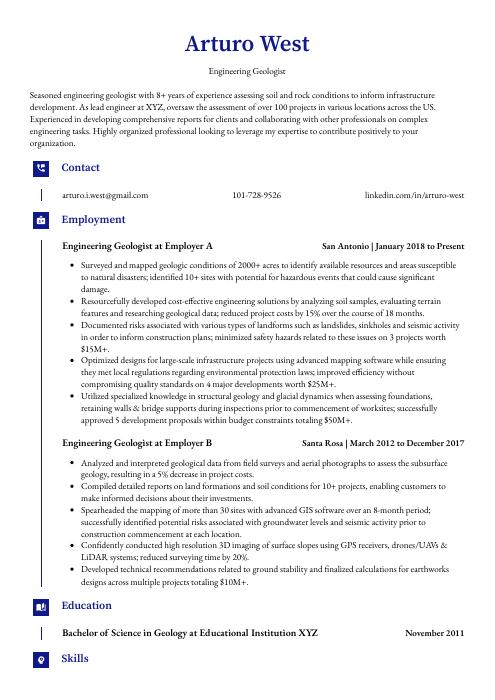 Gharial
Gharial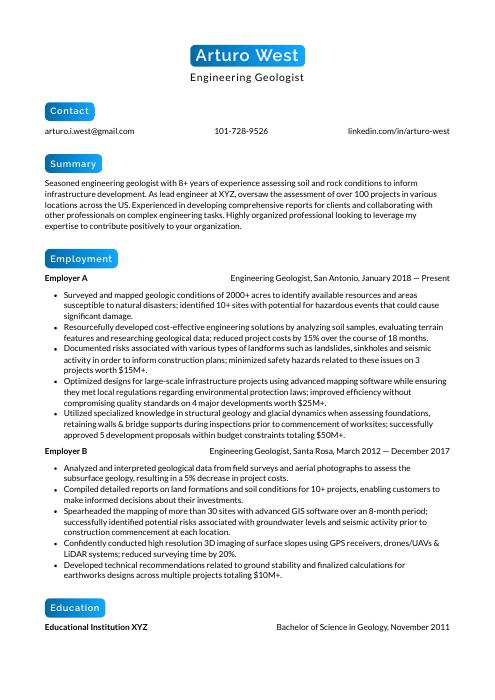 Kinkajou
Kinkajou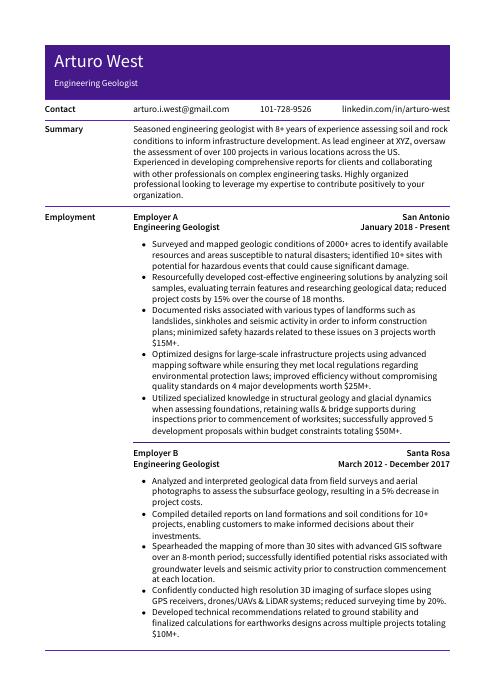 Pika
Pika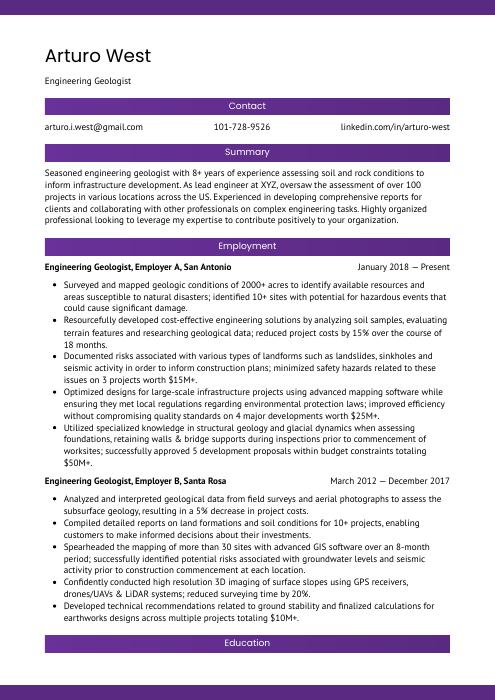 Jerboa
Jerboa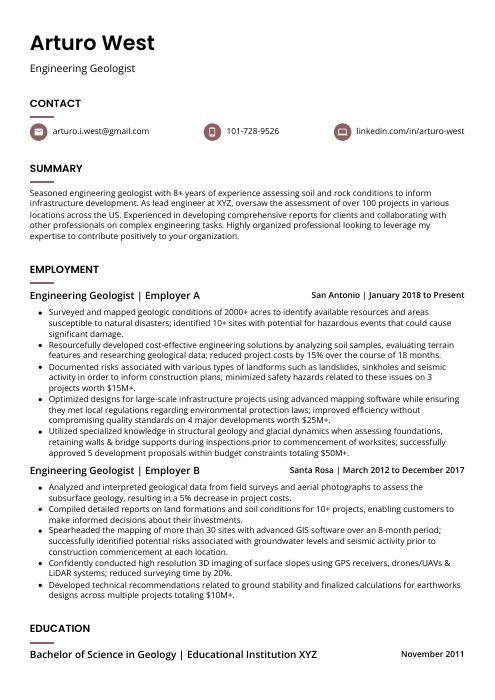 Fossa
Fossa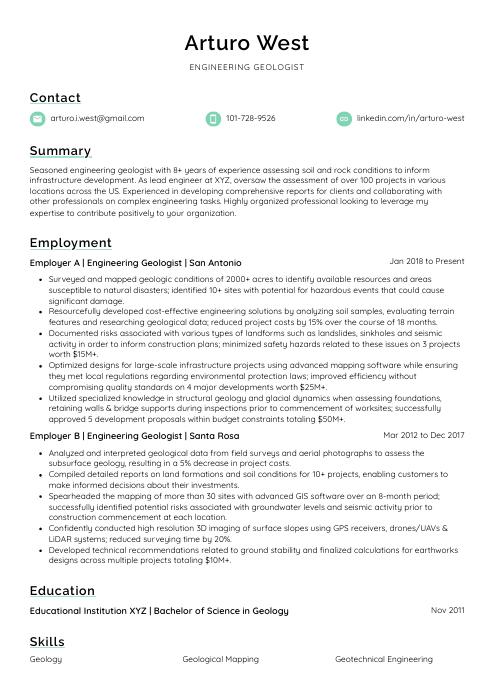 Lorikeet
Lorikeet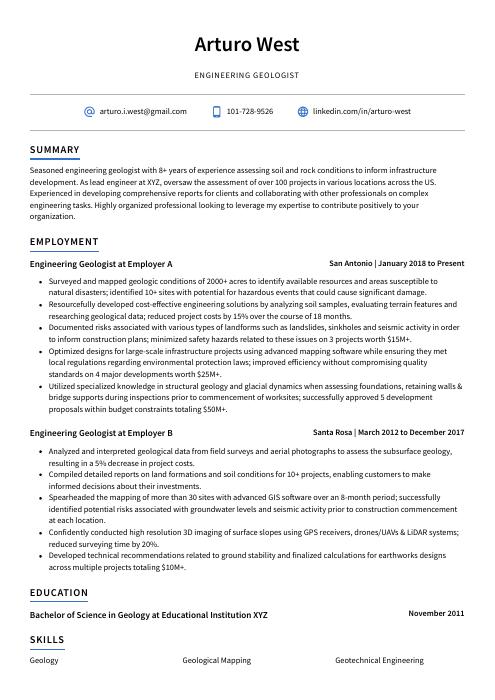 Axolotl
Axolotl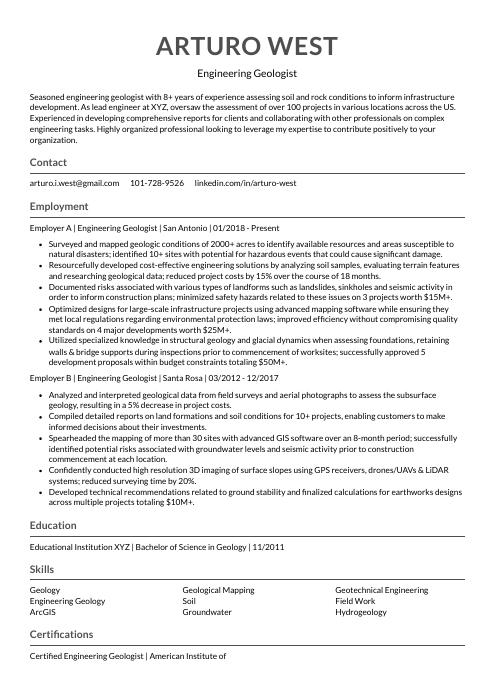 Indri
Indri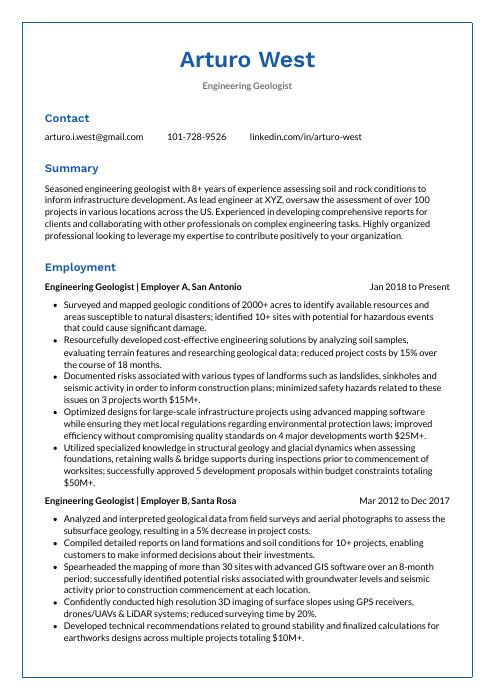 Markhor
Markhor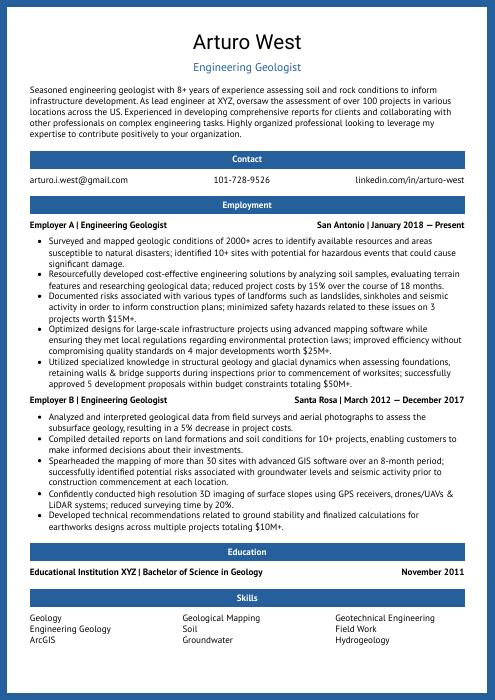 Ocelot
Ocelot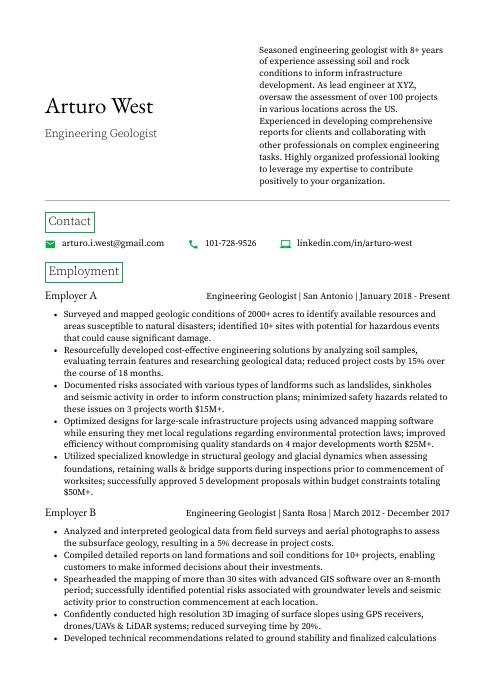 Quokka
Quokka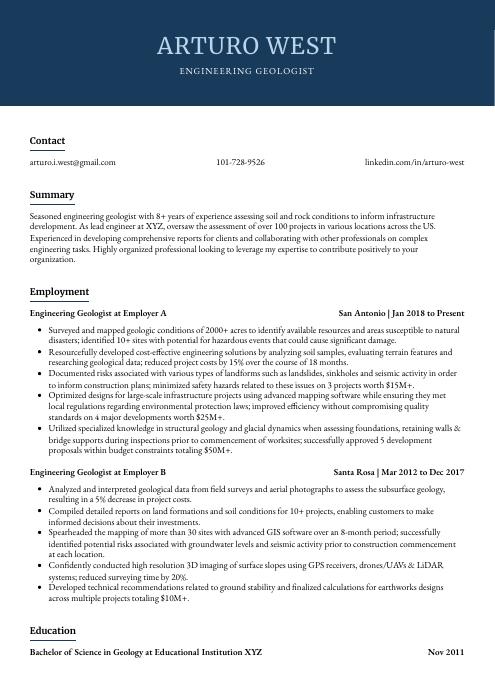 Bonobo
Bonobo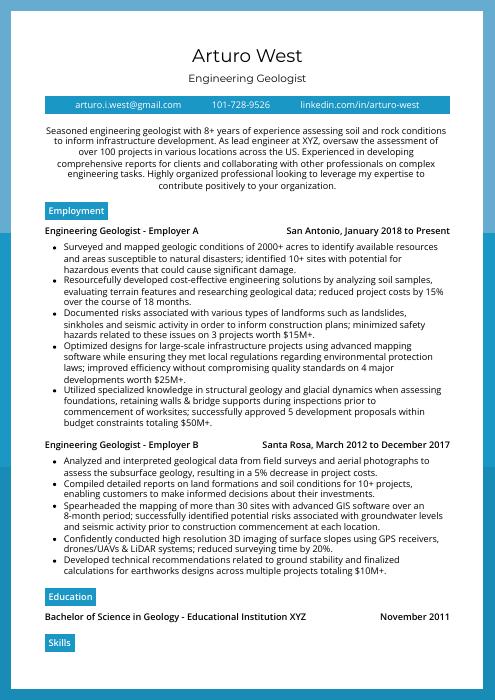 Rhea
Rhea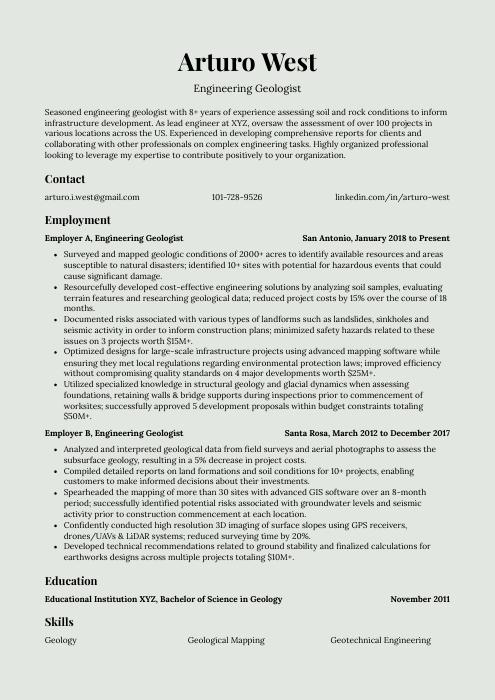 Saola
Saola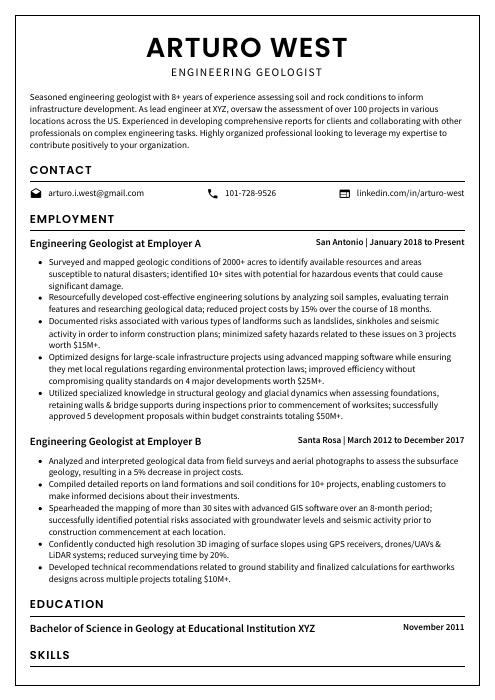 Cormorant
Cormorant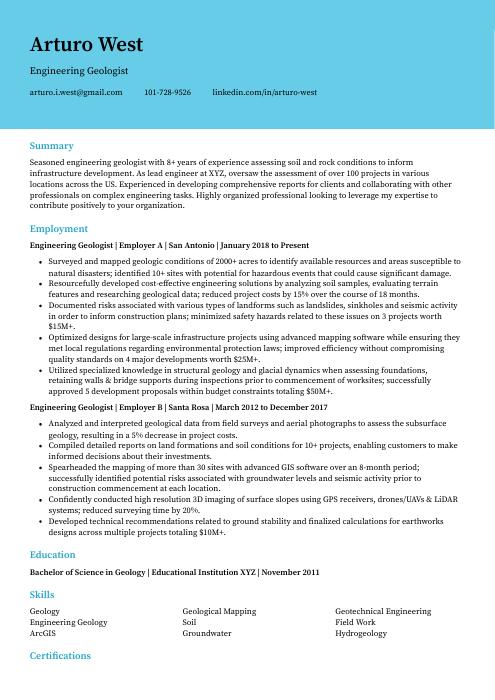 Dugong
Dugong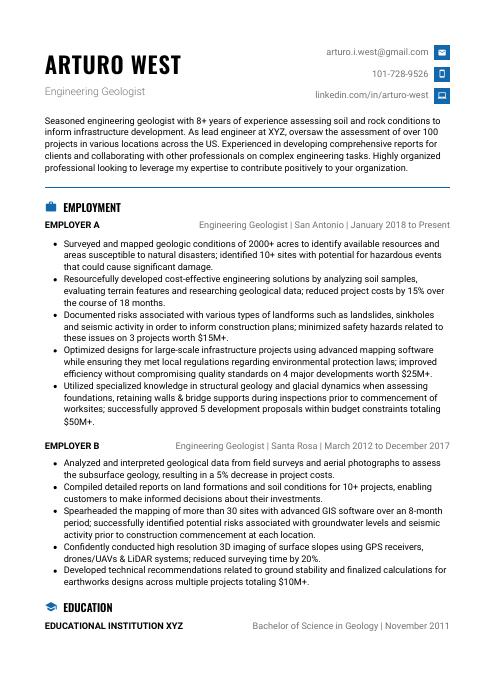 Echidna
Echidna Rezjumei
Rezjumei
